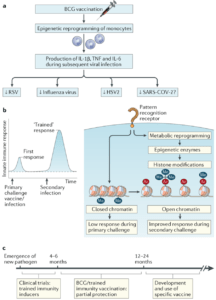
a | Bacillus Calmette–Guérin (BCG) vaccination has been shown to protect against multiple viral pathogens, including respiratory syncytial virus (RSV), influenza A virus and herpes simplex virus type 2 (HSV2). Will it protect against severe acute respiratory syndrome coronavirus 2 (SARS-CoV-2)? b | Trained immunity leading to enhanced innate immune responses to different pathogens after a vaccination is mediated by metabolic and epigenetic rewiring in innate immune cells, which leads to increased gene transcription and improved host defence. c | Trained immunity as a tool for enhancing population immunity during a pandemic ahead of the availability of a specific vaccine. TNF, tumour necrosis factor. (Source: O’Neill & Netea, 2020)
Recent commentary by Luke O’Neill and Mihai Netea discusses “the non-specific beneficial effects of BCG vaccination against viral infections and whether this vaccine may afford protection to COVID-19”. In their commentary, they highlight epidemiological studies that have reported non-specific beneficial effects of BCG against non-related pathogens, including respiratory viruses. O’Neill and Netea also describe how BCG mechanistically enhances secretion of pro-inflammatory cytokines: IL-1b, TNF and IL-6 by monocytes, as well as induce transcriptional, epigenetic and metabolic programming of myeloid cells, a phenomena known as trained immunity. These changes makes innate cells like macrophages and natural killer cells more permissive to activation, resulting in enhanced functional responses upon challenge.
If you have been following immunological news about COVID-19 in the past month or so, then you are aware of a pre-print ecological study that suggested that reduced COVID-19 in some regions of the world could be due to BCG vaccine coverage. Though many scientist highlighted limitations in the study, commentary by O’Neill and Netea summarises the immunological basis for this argument. In line with this evidence, researchers have designed randomised clinical trials, which are currently in progress (United States, Netherlands, Egypt, Australia, & South Africa), that will determine the heterologous protective effect of BCG against COVID-19. If non-specific protective effects are illustrated then BCG could be used to “vaccinate” individuals while we wait for a COVID-19 specific vaccine to be developed.
Notes:
- Bacillus Calmette–Guérin (BCG) vaccine was developed to provide protection against TB, and is part of the expanded programme of immunisation for countries with high TB rates.
- Induction of trained immunity is not specific to BCG, however most experimental and mechanistic studies have been performed using BCG.
- Trained immunity is suggestively transient < 2 years, and may not induce long lasting immunity as observed for adaptive immunity.
References:
- O’Neill and Netea 2020. BCG-induced trained immunity: can it offer protection against COVID-19? Nature Rev. Immunology
- Green et al., (Pre-Print). COVID-19: A model correlating BCG vaccination to protection from mortality implicates trained immunity. medRxiv
- Miller et al., (Pre-Print). Correlation between universal BCG vaccination policy and reduced morbidity and mortality for COVID-19: an epidemiological study. medRxiv
- WHO Bacille Calmette-Guérin (BCG) vaccination and COVID-19 Scientific Brief
Article by Cheleka Mpande










